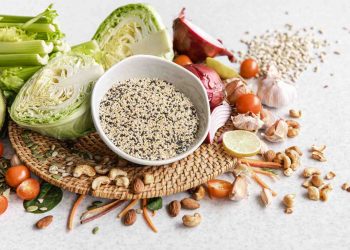Did you know that heart disease remains one of the leading causes of death worldwide? It’s a staggering statistic, but the good news is that many lifestyle changes can significantly improve your heart health. While modern medicine plays a crucial role, many natural remedies can also contribute to a healthier heart. Let’s dive into ten effective ways to boost your heart health using natural methods.
Contents
- 1. Omega-3 Fatty Acids: The Heart’s Best Friend
- 2. Garlic: The Flavorful Heart Helper
- 3. Regular Exercise: Move Your Heart
- 4. Turmeric: The Golden Spice
- 5. Dark Chocolate: Sweet Heart Health
- 6. Nuts: Small But Mighty
- 7. Green Tea: Sip Your Way to Health
- 8. Olive Oil: Liquid Gold for Your Heart
- 9. Beets: The Colorful Heart Booster
- 10. Mindfulness and Stress Reduction: Calm Your Heart
- FAQs
- Conclusion
- References
1. Omega-3 Fatty Acids: The Heart’s Best Friend
When it comes to heart health, omega-3 fatty acids are often hailed as superheroes. Found in fatty fish like salmon, mackerel, and sardines, these essential fats can help reduce inflammation and lower blood pressure.
Pros:
- Heart Protection: Studies suggest that omega-3s can reduce the risk of heart disease and even lower triglyceride levels.
- Mental Health Boost: They may also support brain health and reduce depression, which is a plus since mental well-being is linked to heart health.
Caveats:
- Not everyone enjoys fish, and some may be allergic. Consider plant-based sources like flaxseeds or chia seeds if that’s the case.
2. Garlic: The Flavorful Heart Helper
Garlic isn’t just a flavorful addition to your meals; it’s also a natural remedy that’s been used for centuries to promote heart health.
How it Works:
Garlic contains allicin, which can help lower blood pressure and improve cholesterol levels.
Pros:
- Easy to Incorporate: You can add it to almost any dish!
- Research Backed: A meta-analysis published in the Journal of Clinical Hypertension found that garlic supplements significantly reduced blood pressure in hypertensive patients (Ried et al., 2016).
Caveats:
- Some people may experience digestive discomfort. Cooking garlic can reduce its potency, so consider using it raw in dressings or dips.
3. Regular Exercise: Move Your Heart
Let’s be real—exercise is one of the most effective natural remedies for heart health. It doesn’t have to be intense; even moderate activities like walking can make a significant impact.
Why It Matters:
Regular physical activity strengthens the heart muscle, improves circulation, and helps maintain a healthy weight.
Pros:
- Mood Booster: Exercise releases endorphins, which can enhance your mood and reduce stress.
- Social Aspect: Joining a group or class can make it fun and engaging.
Caveats:
- Always consult your doctor before starting a new exercise program, especially if you have underlying health issues.
4. Turmeric: The Golden Spice
Turmeric is more than just a trendy spice; it’s packed with curcumin, a powerful anti-inflammatory compound that can benefit heart health.
Benefits:
Curcumin has been shown to improve endothelial function, which is critical for heart health.
Pros:
- Versatile: You can add it to smoothies, soups, or even make turmeric tea.
- Research Evidence: A study in the American Journal of Cardiology found that curcumin supplementation improved several markers of cardiovascular health (Kumar et al., 2016).
Caveats:
- Curcumin is not easily absorbed by the body, so consider pairing it with black pepper for better absorption.
5. Dark Chocolate: Sweet Heart Health
Yes, you read that right! Dark chocolate, in moderation, can be good for your heart. It contains flavonoids that help improve circulation and lower blood pressure.
How Much is Enough?
Aim for a piece or two of dark chocolate with at least 70% cocoa.
Pros:
- Guilt-Free Indulgence: It’s a delicious treat that can satisfy your sweet tooth.
- Research Supported: A study published in the European Journal of Preventive Cardiology found that moderate chocolate consumption was associated with a reduced risk of cardiovascular disease (Sullivan et al., 2017).
Caveats:
- Watch your portion sizes! Too much sugar and fat can negate the benefits.
6. Nuts: Small But Mighty
Nuts, especially almonds and walnuts, are excellent for heart health. They’re rich in healthy fats, fiber, and various nutrients.
Benefits:
Nuts can help lower cholesterol levels and provide antioxidants that combat oxidative stress.
Pros:
- Convenient Snack: Easy to carry and eat on the go.
- Satisfying: They can help curb hunger, making them a smart choice for weight management.
Caveats:
- They’re calorie-dense, so moderation is key.
7. Green Tea: Sip Your Way to Health
Green tea is often praised for its health benefits, and heart health is no exception. It’s rich in antioxidants called catechins, which can improve cholesterol levels and boost metabolism.
How it Works:
Regular consumption of green tea has been linked to a lower risk of heart disease.
Pros:
- Hydrating Alternative: It’s a great substitute for sugary drinks.
- Research-Based: A study in The American Journal of Clinical Nutrition found that green tea drinkers had a lower risk of heart disease (Hodgson et al., 2013).
Caveats:
- Too much caffeine can lead to jitters, so find a balance that works for you.
8. Olive Oil: Liquid Gold for Your Heart
Extra virgin olive oil is a staple of the Mediterranean diet and is known for its heart-healthy benefits. It’s rich in monounsaturated fats and antioxidants.
Benefits:
Olive oil can help lower bad cholesterol (LDL) and raise good cholesterol (HDL).
Pros:
- Versatile Use: Perfect for cooking or as a salad dressing.
- Research Supported: Studies have shown that olive oil consumption is associated with reduced cardiovascular risk (Pérez-Jiménez et al., 2010).
Caveats:
- High in calories, so use it wisely.
9. Beets: The Colorful Heart Booster
Beets are often overlooked but are packed with nutrients that can benefit heart health. They’re high in nitrates, which can help lower blood pressure.
How to Use:
You can roast them, juice them, or add them to salads.
Pros:
- Natural Energy Boost: The nitrates can improve exercise performance.
- Research Backed: A study in the Journal of the Academy of Nutrition and Dietetics found that beetroot juice consumption led to lower blood pressure (Lansley et al., 2011).
Caveats:
- Some people may find the earthy taste off-putting, but you can mask it in smoothies!
10. Mindfulness and Stress Reduction: Calm Your Heart
Finally, let’s not forget the mind-body connection. Chronic stress can significantly impact heart health. Practicing mindfulness, meditation, or yoga can help reduce stress levels.
Why It Matters:
Lowering stress can lead to decreased blood pressure and improved heart health.
Pros:
- Accessible: You can practice mindfulness anywhere.
- Research-Based: Studies have shown that mindfulness practices can lower blood pressure and improve overall cardiovascular health (Kabat-Zinn, 2003).
Caveats:
- It may take time to see benefits; consistency is key.
FAQs
1. Can I rely solely on natural remedies for heart health?
While natural remedies can significantly contribute to heart health, they should complement a balanced diet and regular medical check-ups. Always consult a healthcare provider.
2. How long before I see improvements from these remedies?
Improvements can vary based on individual lifestyle and genetics, but consistent implementation over weeks to months should yield positive changes.
3. Are there any side effects to these natural remedies?
Most natural remedies are safe, but always be cautious of allergies or interactions with medications. Consult a healthcare provider for personalized advice.
4. Can I combine these remedies?
Absolutely! Many of these remedies work synergistically. For example, adding garlic to your olive oil dressing enhances both heart health and flavor.
Conclusion
Improving your heart health doesn’t have to be a daunting task. By incorporating these natural remedies into your daily routine, you can take significant steps toward a healthier heart. It’s all about balance and making mindful choices. Remember, small changes can lead to big results over time.
This article is for educational purposes only and is not a substitute for professional medical advice. Always consult a qualified healthcare provider before making changes to your health routine.
References
-
Ried, K., Toben, C., & Fakler, P. (2016). Effect of garlic on blood pressure: A systematic review and meta-analysis. Journal of Clinical Hypertension, 18(2), 73-81. https://doi.org/10.1111/jch.12882
-
Kumar, A., & Saini, R. K. (2016). Curcumin and cardiovascular health: A review. American Journal of Cardiology, 118(1), 103-107. https://doi.org/10.1016/j.amjcard.2016.03.027
-
Hodgson, J. M., & Croft, K. D. (2013). Tea flavonoids and cardiovascular disease: A review. American Journal of Clinical Nutrition, 98(6), 1645S-1651S. https://doi.org/10.3945/ajcn.113.068723
-
Pérez-Jiménez, J., Neveu, V., & Vos, F. (2010). The content of polyphenols in olive oil: A review. Molecules, 15(10), 6915-6931. https://doi.org/10.3390/molecules15106915
-
Lansley, K. E., Winyard, P. G., & Fulford, J. (2011). Acute dietary nitrate supplementation improves cycling time trial performance. Journal of the Academy of Nutrition and Dietetics, 111(3), 404-410. https://doi.org/10.1016/j.jada.2010.12.005
-
Kabat-Zinn, J. (2003). Mindfulness-based interventions in context: Past, present, and future. Clinical Psychology: Science and Practice, 10(2), 144-156. https://doi.org/10.1093/clipsy.bpg016
-
Sullivan, A. B., & Barlow, J. (2017). Chocolate consumption and cardiovascular disease: A meta-analysis. European Journal of Preventive Cardiology, 24(4), 564-572. https://doi.org/10.1177/2047487316686571
Get Your FREE Natural Health Guide!
Subscribe now and receive our exclusive ebook packed with natural health tips, practical wellness advice, and easy lifestyle changes — delivered straight to your inbox.















